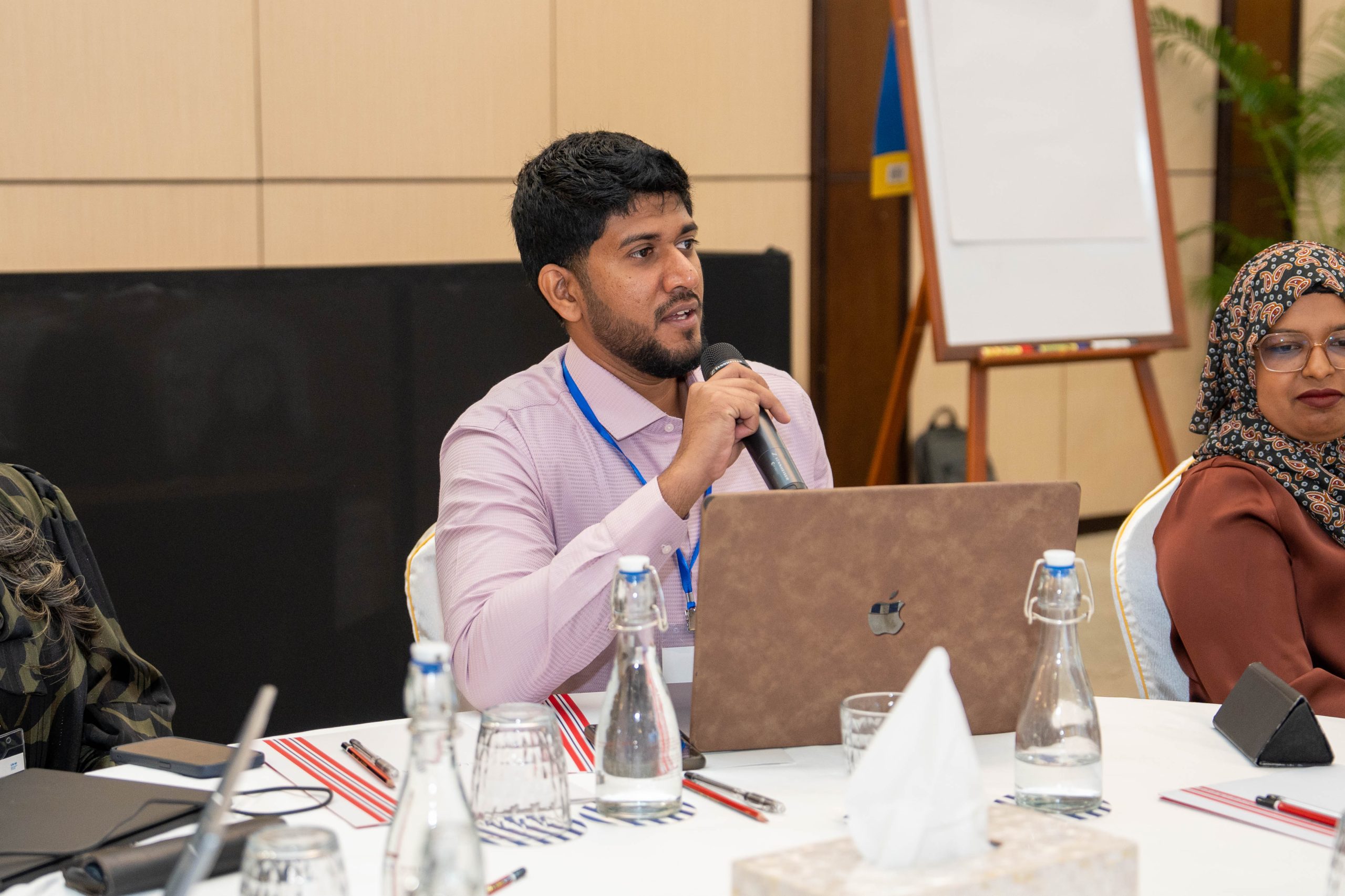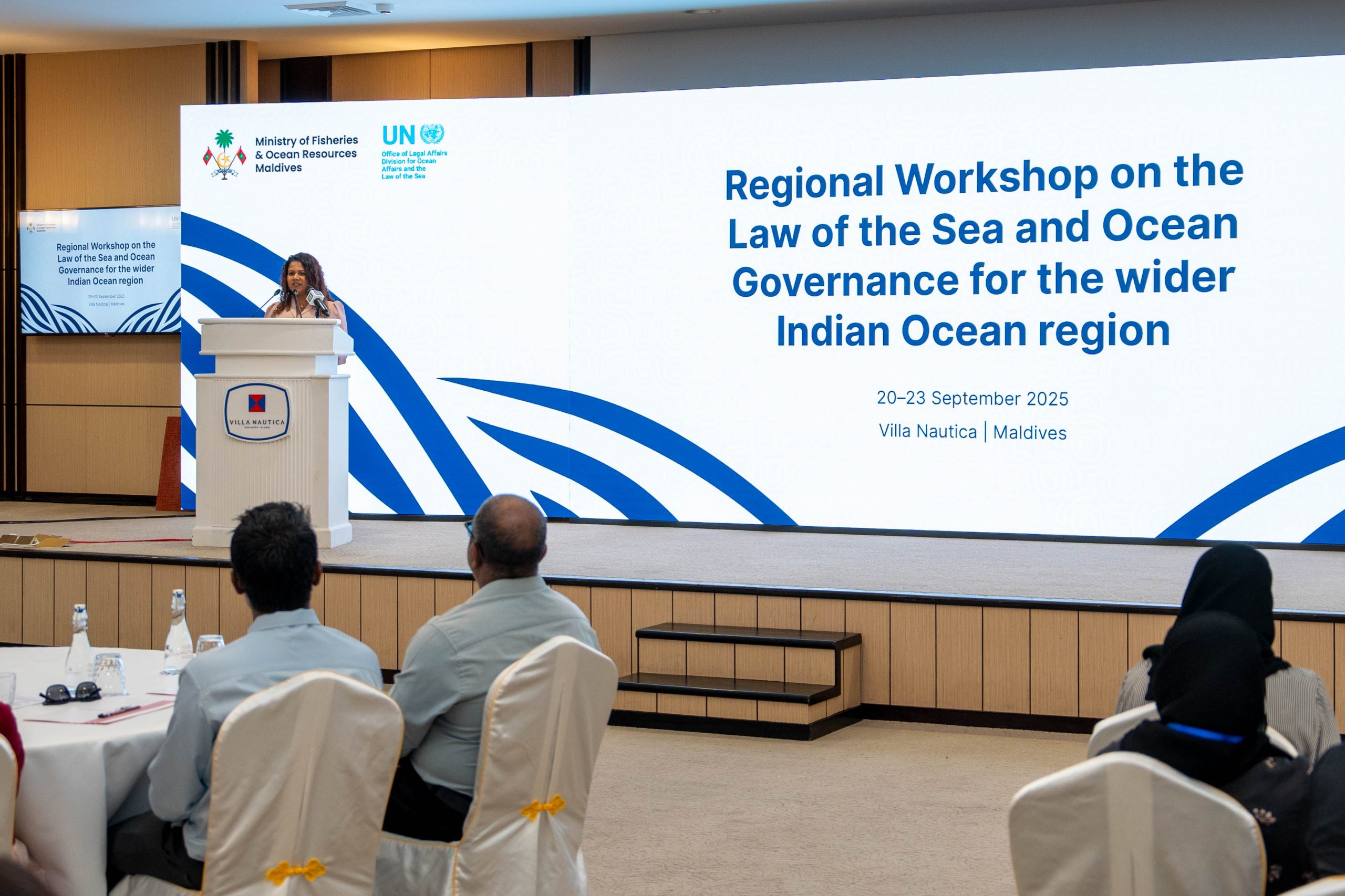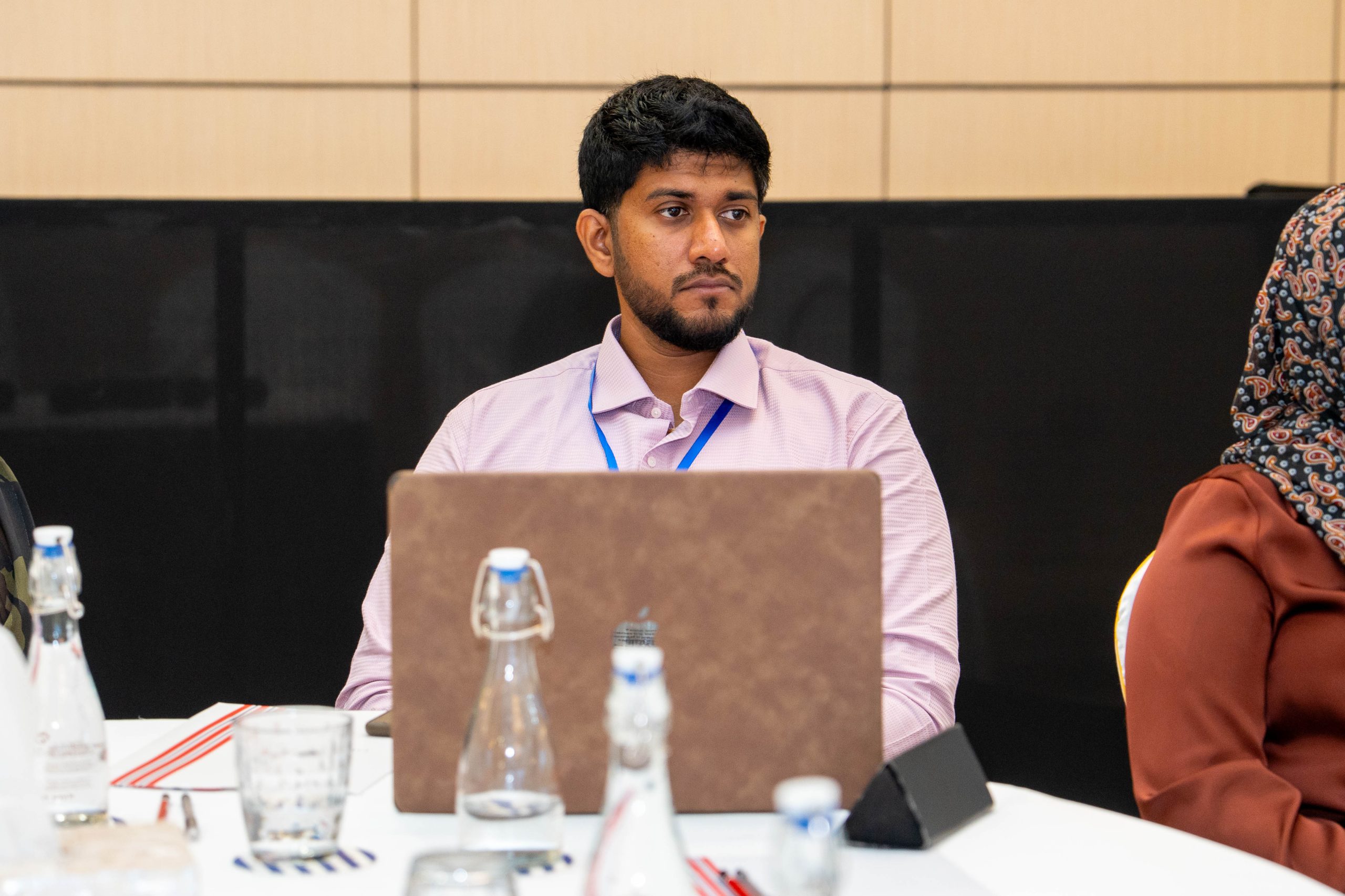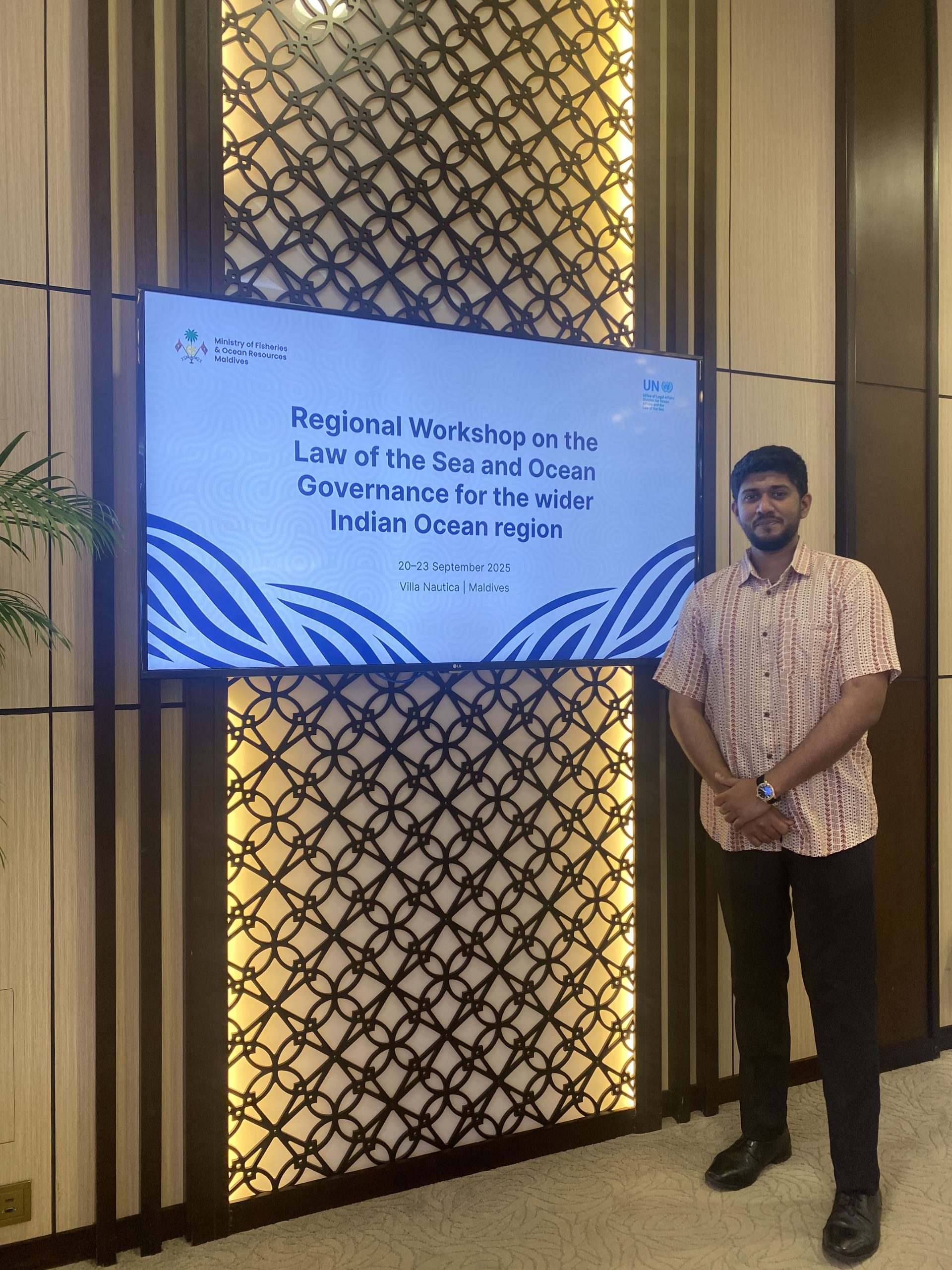
From 20 to 23 September 2025, Mr. Suriya Narayanan Sundararajan, PhD candidate and Research Fellow at the WMU-Sasakawa Global Ocean Institute (GOI), took part in the Regional Workshop on the Law of the Sea and Ocean Governance for the wider Indian Ocean Region; the first law of the sea workshop post the 60th ratification of the BBNJ Agreement. In alignment with his doctoral research on the interface between ocean observation technologies and the ocean law architecture to address the harmful effects of offshore activities in the Indian Ocean, his participation in the workshop provided a meaningful avenue to link scholarly analysis with regional capacity development efforts under the Future Ocean Programme.
The event was convened by the United Nations Division for Ocean Affairs and the Law of the Sea (DOALOS) in partnership with the Ministry of Fisheries and Ocean Resources of the Republic of Maldives.
Photo from the ©United Nations Division for Ocean Affairs and the Law of the Sea (UNDOALOS)
Strengthening Capacity and Regional Cooperation

Photos from the ©United Nations Division for Ocean Affairs and the Law of the Sea (UNDOALOS)

Mr. Suriya Narayanan Sundararajan
Perspectives from Across the Indian Ocean
Among the participants were senior officials from Prime Ministers’ Offices, Ministries of Foreign Affairs, Ministries of Fisheries and the Department of Biodiversity Beyond National Jurisdiction (BBNJ) in countries in such as Pakistan, Thailand, Iran, Indonesia, Sri Lanka, Bangladesh, Mauritius, Timor-Leste, Yemen and Oman. Delegates from the Bay of Bengal Programme and the Indian Ocean Commission, contributed perspectives shaped by their own complex maritime contexts. Technical expertise provided by global bodies such as the United Nations Office on Drugs and Crime added a complementary dimension on law enforcement and transnational issues.
Representatives from government agencies, international organizations, and technical experts came together with a shared purpose — to explore the evolving challenges of the oceans and to build regimes-based, institutional and technical capabilities required to meet them.
Legal, Policy, and Environmental Challenges
Over the course of the workshop, participants reflected on the complex legal and policy frameworks that define the rights and responsibilities of states under UNCLOS in the region. Special attention was given to the governance of maritime zones, including territorial seas, exclusive economic zones (EEZs), and continental shelves; the effective implementation of the BBNJ Agreement; as well as to the delicate processes of boundary delimitation that often demand both technical precision and diplomatic skill.
The conversations broadened to embrace the pressing realities of environmental change such as climate impacts, sea-level rise, pollution, and the sustainable use of living marine resources, especially fisheries, all of which weigh heavily on coastal and island nations of the Indian Ocean.
Advancing Regional Ocean Governance
The spirit of the workshop was not merely technical but collaborative, weaving together the experiences of practitioners, policymakers, and experts on natural sciences, law and diplomacy. In doing so, it sought to nurture a shared understanding of the oceans as a common heritage, demanding stewardship and solidarity. By the close of the event, participants left with a deeper appreciation of the tools and mechanisms available under international law, as well as a clearer sense of the capacity gaps that must still be addressed.

Photo from the ©United Nations Division for Ocean Affairs and the Law of the Sea (UNDOALOS)
An important moment in the programme was the Round Table Discussion on Capacity-Building Needs in Ocean Affairs and the Law of the Sea. This session served as an open forum for participants to articulate the specific challenges faced within their national and regional contexts. The dialogue brought to light a range of sub-regional concerns, including the persistent need for technical training, the strengthening of institutional frameworks and the development of more robust responses to climate change and marine pollution. Delegates emphasized that while national efforts are important, many of these issues transcend borders and require cooperative approaches at the regional and sub-regional levels. The discussion underscored the urgency of sustained investment in education, legal expertise, and technological support to empower states to meet their obligations under international law.
The outcomes of the meeting point toward a future of stronger regional coordination and more coherent national strategies. Countries expressed a commitment to integrating the lessons of the workshop into their policies, to seek further technical assistance where needed, and to explore opportunities for enhanced data sharing and cooperative research. In this way, the workshop did more than transfer knowledge; it planted the seeds of a networked community across the Indian Ocean, one poised to defend and sustain the marine environment in the face of the profound challenges that lie ahead.
The insights and commitments emerging from this workshop also resonate strongly with the vision of the Future Ocean Programme, reinforcing its mission to address biodiversity loss, climate change, and marine pollution while shaping the governance of the high seas over the next half century.
For more information please contact the WMU-GOI at goisecretariat@wmu.se
About the World Maritime University
The World Maritime University (WMU) in Malmö, Sweden is established within the framework of the International Maritime Organization, a specialized agency of the United Nations. The mission of WMU is to be the world centre of excellence in postgraduate maritime and oceans education, professional training and research, while building global capacity and promoting sustainable development. WMU is an organization by and for the international maritime community and is committed to the United Nations 2030 Agenda for Sustainable Development.
About wmu-goi
The World Maritime University (WMU)-Sasakawa Global Ocean Institute (GOI) is an independent focal point for the ocean science-policy-law-industry-society interface where policymakers, the scientific community, regulators, industry actors, academics, and representatives of civil society meet to discuss how best to manage and use ocean spaces and their resources in accordance with the United Nations 2030 Agenda for Sustainable Development. The Institute was inaugurated in May 2018 and made possible through generous support from The Nippon Foundation of Japan, the Governments of Sweden, Canada, and Germany, as well as the City of Malmö.
About Public International Maritime Law (PIML)
The United Nations Convention on the Law of the Sea (UNCLOS), adopted in 1982, is widely regarded as the “constitution of the oceans.” It establishes the legal framework governing all aspects of ocean use, including navigation rights, maritime zones, resource management, and environmental protection. By balancing the rights and responsibilities of coastal and landlocked states alike, UNCLOS provides the foundation for international cooperation and peaceful dispute settlement, ensuring that the world’s oceans are managed as a shared space for the benefit of present and future generations.
